
PREV ARTICLE
NEXT ARTICLE
FULL ISSUE
PREV FULL ISSUE
PRINCETON RECEIVES BELL COLLECTION OF DUCATSAn extraordinary set of medieval gold coins has been acquired by the numismatic collection at the Princeton University Library. Curator Alan Stahl published this note on November
17, 2017. -Editor
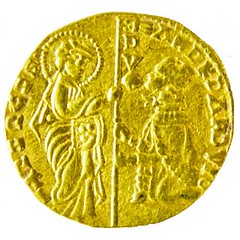 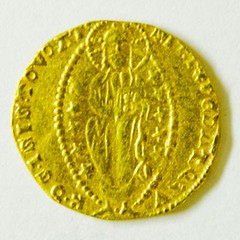 Venice, Andrea Dandolo, 1343-1354, gold ducat The Princeton University Library Numismatic Collection has just received by bequest the Benjamin R. Bell Collection of Ducats. Bell, who worked as a coin dealer and died at a young age earlier this year, was a collector and scholar of the medieval ducats of Venice and their manifold imitations. The collection of 190 gold coins is particularly rich in the ducats attributed to Italian, Greek, and Turkish minters and later examples struck on the Indian sub-continent; it also includes many examples of significantly lower weight and fineness than Venetian ducats, which Bell argued to be minted to fit into the Byzantine monetary system. Bell chose to leave his collection to Princeton because of the presence there of a substantial number of coins of these types, which have already served as the basis of research by students and faculty. 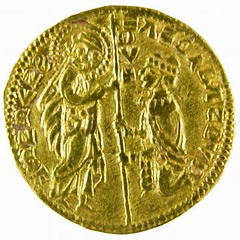 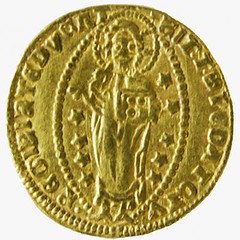 Imitation of ducat of Andrea Dandolo, attributed to Turkish minters of Asia Minor The Venetian ducat established itself in the course of the fourteenth century as the dominant coin of Mediterranean trade, eclipsing in importance Islamic and Byzantine denominations. Some Mediterranean mints identified their rulers on ducat issues copied after those of Venice, but others retained the name of Venetian doges, with only subtle changes in style and inscriptions that allow modern scholars to distinguish them from authentic issues. It is through the careful comparison of the dies and punches used to produce surviving specimens that attributions can be made to the actual issuers. The research potential of the Bell collection is greatly enhanced by accompanying information on the provenance of individual pieces, as well as scientific analyses of their chemical content. The large collection of imitation ducats acquired by Princeton as part of the Latin Orient Collection in 2007 with the support of the Stanley J. Seeger Hellenic Fund has already served as the basis of the research of Sarah Kampbell, who received her Ph.D. in History in 2013. With the Bell Collection added to its existing holdings, Princeton now has by far the largest public collection of the series, which is increasingly understood to have played an important role in the commerce of the eastern Mediterranean and the Near East in the medieval and early modern periods.  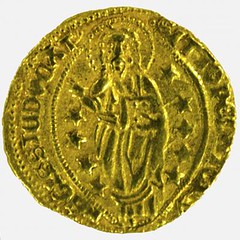 Filippo Maria Visconti, 1421-36, gold ducat minted in Chios To read the complete article, see: Wayne Homren, Editor The Numismatic Bibliomania Society is a non-profit organization promoting numismatic literature. See our web site at coinbooks.org. To submit items for publication in The E-Sylum, write to the Editor at this address: whomren@gmail.com To subscribe go to: https://my.binhost.com/lists/listinfo/esylum All Rights Reserved. NBS Home Page Contact the NBS webmaster 
|